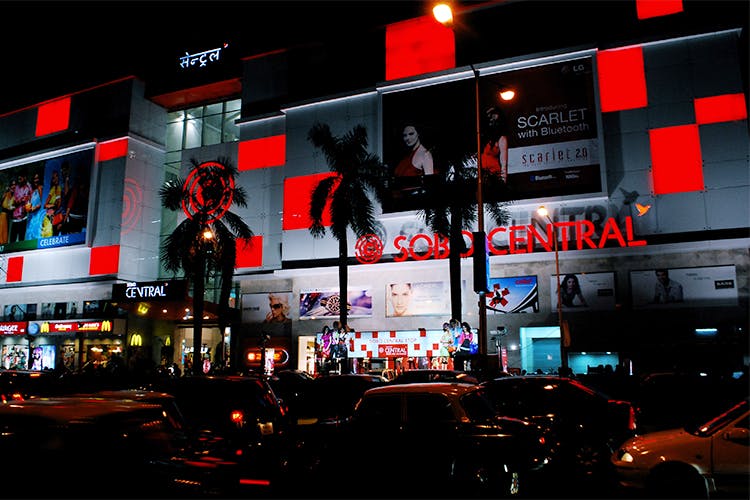Kishore Biyani’s Surprise Bid Of Rs 476 Cr For Mumbai’s SOBO Mall; Next-Gen Biyani’s ‘Foodstories’ Venture; A Dual Play Of Cards?
In a bold and unexpected move, Kishore Biyani has emerged as a contender for SOBO Central Mall. With a whopping offer of Rs 476 crore to settle the mall's debt, Biyani's bid adds a new dimension to the unfolding chronology of this iconic Mumbai landmark. Meanwhile, the next generation of the Biyani family is set on their latest venture - Foodstories. Led by Ashni and Avni Biyani, daughters of the Kishore Biyani, this premium gourmet store looks to luxury dining experiences in the National Capital Region (NCR). However, amongst all the twists and turns, there seem to be perplexing contradictions within the Indian business arena, raising critical questions about bankruptcy, loan approvals, and the underlying dynamics governing financial transactions.

In a surprising turn of events, Kishore Biyani, has thrown his hat into the ring with a staggering offer of Rs 476 crore to settle the debt of Bansi Mall Management Co (BMMCPL), the owner of SOBO Central Mall located in Mumbai’s prestigious Haji Ali area.
This surprising move comes hot on the heels of the creditors’ acceptance of a Rs 475-crore bid from the prominent Runwal Group for the same property.
The same took a new twist when Biyani approached the debts recovery tribunal (DRT) to challenge the lenders’ decision and present his offer for settling the debt independently.
Sources close to the development reveal that Biyani had been in discussions with the lenders previously but became more proactive following the approval of Runwal Group’s bid.
Hence, it looks like the stage is now set for a legal battle as the court is scheduled to deliberate on Biyani’s proposition later this month.
The stakes are high for all parties involved.
SOBO Central Mall, once a bustling commercial hub, now stands largely vacant, save for a lone McDonald’s outlet established at its inception in 1999.
Its drop into obscurity is mainly because of the rise of newer shopping destinations within Mumbai and the suburbs, compounded by the economic fallout of the Covid-19 pandemic. Moreover, the mall’s ties with Future Group companies, themselves under financial strain, further deepened its woes.

The Game
Canara Bank and Punjab National Bank (PNB) find themselves at the forefront of this financial game, with Canara Bank leading the consortium of lenders with outstanding loans amounting to Rs 131 crore, closely followed by PNB with dues of Rs 90 crore.
PNB, in collaboration with Union Bank of India, holds a secondary charge over BMMCPL’s assets, leveraging the lease rental discounting of Future Brands, a group entity.
Biyani’s bid, buoyed by the backing of a prominent real estate and retail developer, hints at a strategic vision to unlock the latent potential of this prime commercial property in South Mumbai.
However, the lenders remain cautious, emphasizing the need for Biyani to make tangible financial commitments to validate the seriousness of his offer.
Although with the possibility of redevelopment looming large, lenders are optimistic about attracting real estate investors, which could significantly bolster the prospects of debt recovery.
As the legal battle progresses and the fate of SOBO Central Mall hangs in the balance, all eyes are on Kishore Biyani and the lenders as they manage the complexities of debt restructuring and asset revitalization.

The Rise Of Next Gen Biyani’s
Meanwhile, battling financial turbulence and restructuring, comes news of Ashni and Avni Biyani, daughters of Kishore Biyani, who are set to introduce a premium luxury gourmet store in the heart of the National Capital Region (NCR).
Branded as Foodstories, this venture is set to cater to the discerning tastes of a loyal clientele, reminiscent of the legacy built by its predecessor, Foodhall – with Avni Biyani’s Honestly Italian Private Limited (HIPL) taking the lead, supported by the expertise of Think 9 Consumer Technologies.
The seriousness of the venture can be seen as HIPL executives have launched to reconnect with the vendors and partners of Foodhall, extending invitations to join hands in this new venture.
As stated in a presentation shared with potential partners, the vision is to curate a gourmet food platform that seamlessly blends digital innovation with immersive retail experiences.
Foodstories aims to deliver bespoke services and luxury experiences tailored to the evolving tastes of its clientele, targeting affluent individuals. It plans to debut with two stores in NCR, and the venture anticipates a robust in-store and online footfall.
However, amidst the excitement surrounding this new venture, questions remain about the rebranding strategy – why depart from the familiar terrain of Foodhall, especially when the essence and target audience remain unchanged?
The answer lies in the turbulent history of Foodhall, entwined with the challenges faced by its parent company, Future Retail. The Corporate Insolvency Resolution Process (CIRP) in 2022 marked a turning point, prompting a strategic realignment to guide the shifting tides of the culinary market.
While Foodhall itself was thriving, the overarching challenges faced by the Future Group due to high leverage posed a threat to this budding yet successful brand.
However, employing a shrewd strategy, Future Group devised a plan to safeguard Foodhall from being entangled in the resolution process.

Dubbed as “Ring-fencing Foodhall,” the Biyanis executed a swift maneuver precisely on the day when Bank of India initiated the process to declare Future Retail insolvent.
They swiftly inked a Business Services Agreement (BSA) with TNSI Retail, a subsidiary of Future Retail, entrusted with managing the WHSmith bookstores in airports.
Under this agreement, the day-to-day operations of seven Foodhall outlets across Mumbai, Delhi, and Bengaluru were handed over to TNSI Retail, effectively shielding Foodhall from the clutches of the resolution professional (RP) overseeing Future Retail’s affairs.
Initially, this arrangement appeared seamless. However, discontent brewed among some vendors and partners of Foodhall as their payments and dues began to accumulate.
The legality of the BSA came under scrutiny, with Nangia and Co LLP categorizing it as an undervalued transaction falling under the purview of “transactions defrauding creditors” as per section 45 of the Insolvency and Bankruptcy Code (IBC) 2016.
Upon analysis, it was revealed that Future Retail had granted a license to TNSI Retail to operate Foodhall for a nominal fee of 1% of net sales, without providing any valid business rationale or lender approval.
In response, the RP commissioned independent valuers to assess the appropriate license fee for the use of the Foodhall brand. Adroit Appraisers and Research valued it at 3.5%, while GAA Advisory LLP proposed a fee of 4% of net sales.
Subsequently, it was deduced that the appointment of TNSI Retail as a franchisee for Foodhall stores constituted an undervalued transaction under section 45 (2) (b) of the IBC 2016.
The RP proceeded to file applications under Section 45 for adjudication by the National Company Law Tribunal (NCLT). Following a directive from the National Company Law Appellate Tribunal (NCLAT) in November 2023, the NCLT Mumbai bench was tasked with issuing orders within three months.
In a recent development, the Supreme Court awarded a compensation of INR 40 lakh to Koinonia to vacate premises in Delhi’s Chanakya Mall and Gurugram’s Two Horizon.
The court also secured commitments from realty companies Riveria Commercial and Sidhant Real Estate Developers, both DLF group entities, to refrain from entering into new agreements with TNSI Retail. This compensation was granted without prejudice to Koinonia’s claims against Future and TNSI before the NCLT.

The Viewpoint
From a perspective where Kishore Biyani has emerged as a bidder for the Mumbai mall, the situation raises serious concerns about the integrity of our financial system and the accountability of Indian business houses.
It’s baffling to witness instances where entities claim bankruptcy, yet continue to engage in lavish spending, such as purchasing a 100 crore property.
Such actions not only call into question the legitimacy of the bankruptcy claims but also raise suspicions that bankruptcy might be nothing more than a calculated ploy to evade financial obligations.
Likewise, the ease with which these business houses secure massive loans without adequate collateral or scrutiny is equally alarming.
It seems like there’s a double standard at play, where ordinary individuals struggle to obtain loans for basic needs like housing or starting a small business, while influential conglomerates effortlessly secure loans worth thousands of crores.
This glaring inequality in access to financial resources damages the principles of fairness and equity in our society and the prevalence of such practices paints a grim picture of the state of corporate governance and regulatory oversight in our country.
At the same time, it is disheartening to see powerful entities exploiting loopholes in the system for personal gain, while evading accountability for their actions. The fact that they seem to get away with it only adds insult to injury, eroding public trust in the institutions meant to uphold financial integrity.
Lately, the revelation of election bonds as a potential tool for securing loans adds another layer of concern.
If true, it implies a troubling collusion between political and financial interests, where electoral contributions are leveraged to gain preferential treatment in the financial sector.
Such practices outright undermine the democratic process and reinforce the perception that the system is rigged in favour of the wealthy and well-connected.






